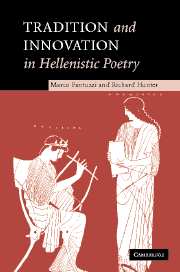Book contents
- Frontmatter
- Contents
- Preface
- List of abbreviations
- 1 Performance and genre
- 2 The aetiology of Callimachus' Aitia
- 3 The Argonautica of Apollonius and epic tradition
- 4 Theocritus and the bucolic genre
- 5 Epic in a minor key
- 6 The style of Hellenistic epic
- 7 The epigram
- 8 The languages of praise
- 9 Hellenistic drama
- 10 Roman epilogue
- Bibliography
- Index of passages discussed
- General index
10 - Roman epilogue
Published online by Cambridge University Press: 22 September 2009
- Frontmatter
- Contents
- Preface
- List of abbreviations
- 1 Performance and genre
- 2 The aetiology of Callimachus' Aitia
- 3 The Argonautica of Apollonius and epic tradition
- 4 Theocritus and the bucolic genre
- 5 Epic in a minor key
- 6 The style of Hellenistic epic
- 7 The epigram
- 8 The languages of praise
- 9 Hellenistic drama
- 10 Roman epilogue
- Bibliography
- Index of passages discussed
- General index
Summary
A CRITICAL SILENCE?
What little evidence there is from the dark period of the late third and second centuries bc suggests that the great names of third-century poetry – Callimachus, Apollonius, Theocritus, Aratus – soon established themselves as major and influential figures: they had become part of the Greek poetic tradition. ‘Second-generation’ Hellenistic poets, such as Euphorion, acknowledged the now ‘classic’ status of their predecessors by citation and rewriting. It is, however, important that, as far as we can tell, these predecessors were treated in the critical tradition as individual poets to be discussed and explained, not as the leaders of a ‘movement’ or a new kind of poetry. The traces that they have left in, say, the exegetical work of Aristarchus show that scholars were using Hellenistic poets to explain the text of Homer, as all poets later than Homer (οἱ νεώτεροι) were used, and perhaps also occasionally explaining them for themselves; Callimachus at least was a well-known text to Aristarchus. In other words, what we think of as ‘Hellenistic poetry’ was, to put it simply, just ‘poetry’.
The evidence for this critical attitude is fragmentary, but tells a fairly clear tale. Thus, the surviving interlinear ‘commentary’ (? early second-century bc) on the ‘Victoria Berenices’ (SH 254–269) does not differ in kind from the simple exegetical notes attached to the texts of many archaic and classical poets, and a (?) late third-/early second-century commentary on a riddling epigram on the oyster cites not only Sophocles but also Menander's contemporary Diphilos and the poet Theodoridas (second half of the third century) as examples drawn from an undifferentiated poetic tradition.
- Type
- Chapter
- Information
- Tradition and Innovation in Hellenistic Poetry , pp. 444 - 485Publisher: Cambridge University PressPrint publication year: 2005



